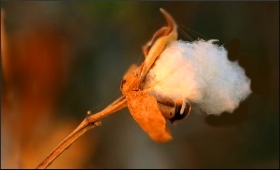|

|
Demand for eco-friendly fabrics propels organic cotton farming in India
|
|

|
|
| Top Stories |
 |
|
|
|
SME Times News Bureau | 16 May, 2018
Barku Jairam, a 55-year-old farmer from Barwani of Madhya Pradesh, has
taken up cultivating organic cotton, which he claims, has significantly
brought down input costs besides ensuring a decent yield.
The
demand for organic cotton from global apparel companies has prompted
1,000-odd farmers in the state to switch to eco-farming to grow cotton
using bio-fertilisers and pesticides manufactured from medicinal plants.
The
C&A foundation -- the corporate foundation of fashion retail
clothing chain C&A -- has tied up with a few non-profits in the
country to promote organic cotton farming as a part of its efforts to
procure sustainable raw material for its business.
Although
yields from organic farming are lower than by using Genetically Modified
(GM) seed, chemical fertilisers and pesticides, the negligible input
cost makes it a profitable business, Jairam said.
"Till three
years ago, I would earn up to Rs 27,000 per acre when I used GM hybrid
seeds but the input cost would be around Rs 20,000 due to expensive
chemical pesticides and fertilisers.
"Now, I earn around Rs 20,000 per acre but the input cost has reduced to just Rs 5,000," Jairam told IANS.
Farmers
like Jairam produce bio-fertiliser for free from manure and
agricultural waste from their fields and pesticides from extracts of
medicinal plants such as neem, karanj (pongamia), ratanjot (alkanet
root), besharam (ipomoea) and custard apple leaves along with cow urine.
Non-profits Aga Khan Foundation and Action for Social
Advancement are helping the C&A Foundation in promoting and
procuring organic cotton.
According to the Union Agriculture
Ministry, 30.01 million bales (of 170 kg each) of cotton -- roughly 5.1
billion tonnes -- were produced in the country in 2015-16. The ministry,
however, doesn't give out the breakup of organically grown cotton vs
other methods.
At 60,184 tonnes, India was the largest organic
cotton producer in the world in 2015-16, accounting for 56 per cent of
the total production of 107,980 tonnes while Madhya Pradesh accounted
for 24 per cent, as per the C&A Foundation. Organic cotton accounted
for less than one per cent of cotton produced globally.
Another
farmer, Dhansingh Ghana, said hybrid seeds for organic farming were
provided for free for first three years by the foundation as incentives
to make them self-reliant.
"Even if we will have to pay for seeds
now, the input cost would not be much as major components such as
bio-fertilisers and pesticides are still free," said Ghana.
According
to these farmers, who had come to the state's capital Bhopal to attend
an event on organic farming, the foundation gave them Rs 200-300 more
per quintal when compared with the government rates.
Anita
Chester, Head of Sustainable Raw Materials of C&A Foundation, said
the negative impact of climate change has driven brands across the globe
to look for sustainable alternatives.
"The way climate change is impacting all of us, the whole industry thinks that the businesses have to be more responsible.
"In
this inequitable world, there is growing consciousness that there has
to be more equity in what we do. This is what drives the brands to push
themselves and set targets to source sustainable materials," she said.
Organic
cotton production needs 93 per cent less water as compared to the
conventional cotton cultivation, according to the foundation.
It
also said the climate change impact is of 338.5 kg CO2 equivalent by
organic cotton as opposed to 680.2 kg CO2 equivalent by conventional
cotton.
The brands have sustainability commitment and so the demand for organic material is very strong now, said Chester.
"They are giving clear signal that organic is important and special. So it needs to grow," she said.
Chester
said her foundation supports the farmers who want to go organic through
capacity building and helping them in getting certification, which
helps them to link with the markets.
While there are hurdles such
as non-availability of seeds, lack of input agencies, poor market links
for organic farming, the foundation is bringing all stakeholders,
including the government to cross the barriers, she said.
Faiz
Kidwai, Managing Director of the Madhya Pradesh Agriculture Marketing
Board, sought a fixed price for farmers to promote organic cotton.
"There
is a huge potential for organic farming in the state but farmers are
not keen on doing it because they do not see any benefits due to lack of
market, supply chain or value chain.
"We will have to assure fixed market price to bring them on board," Faiz told reporters on the sidelines of the event.
|
|
|
| |
|
|
|
|
|
|
|
|
|
|
|
|
|
|
| |
| Customs Exchange Rates |
| Currency |
Import |
Export |
US Dollar
|
66.20
|
64.50 |
UK Pound
|
87.50
|
84.65 |
Euro
|
78.25
|
75.65 |
| Japanese
Yen |
58.85 |
56.85 |
| As on 13 Aug, 2022 |
|
|
| Daily Poll |
 |
 |
| PM Modi's recent US visit to redefine India-US bilateral relations |
|
|
|
|
|
| Commented Stories |
 |
|
|
|
|
|
| |
|